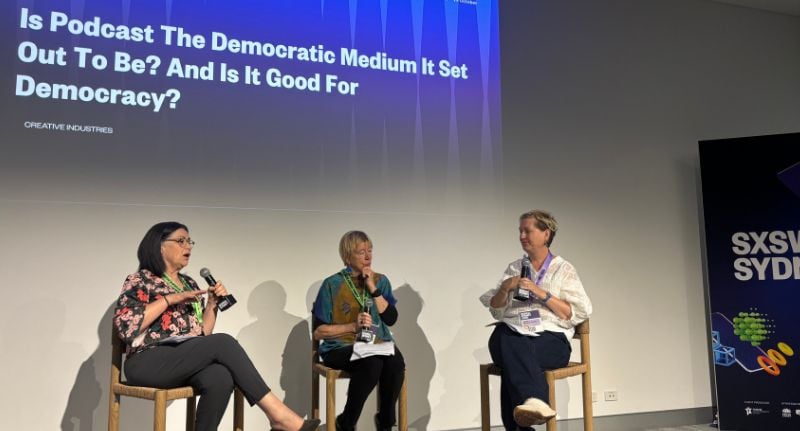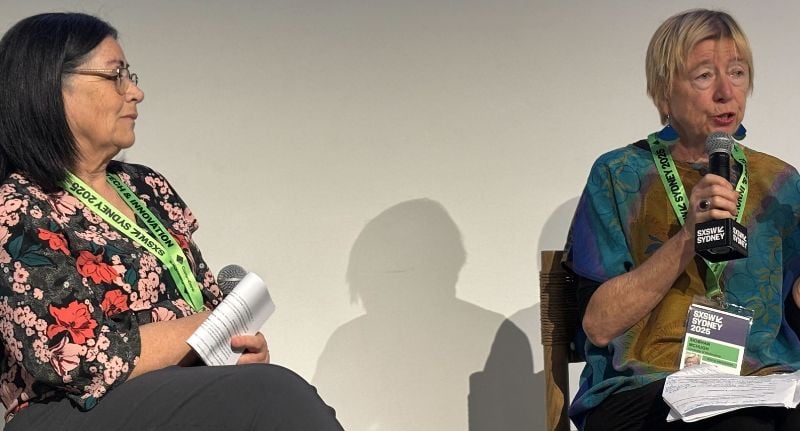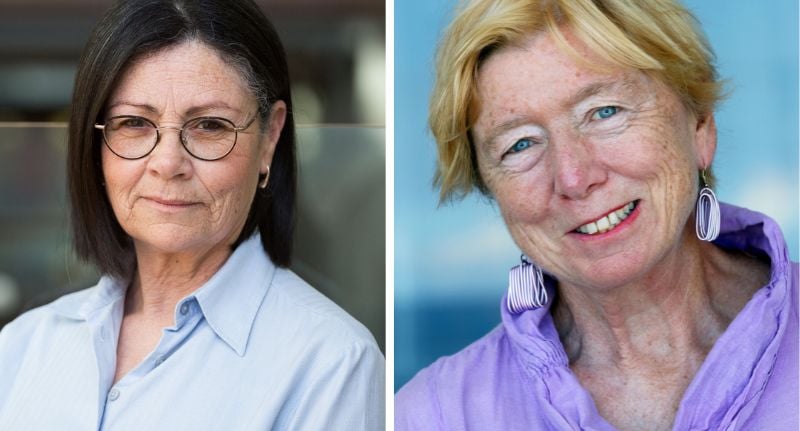Podcasting was once hailed as the most democratic of media. It was supposed to be open, unfiltered, and free from gatekeepers. But as the medium has evolved, so too have its risks (and its paywalls).
At SXSW Sydney’s Is Podcast the Democratic Medium It Set Out to Be? And Is It Good for Democracy? session, leading voices Siobhan McHugh and Professor Monica Attard unpacked how podcasting’s original ideals have collided with the realities of influence, misinformation, and accountability.
A medium born to be free
For McHugh, an award-winning podcast producer, oral historian, and author of The Power of Podcasting: Telling Stories Through Sound, the origins of podcasting are rooted in openness and idealism.
“Podcasting started out with the intention of being a free ecosystem,” McHugh told the SXSW audience. She credits much of that vision to technologist Dave Winer, who helped pioneer the RSS feed around 2000.
“He said, ‘I deliberately wanted to make it an open space. I’m far more interested in creating a medium than in making any money.’”
That decision, she explained, shaped the DNA of podcasting as an unpaywalled, audience-first medium.
“They couldn’t put a paywall around it. You could get your work out there on the internet and straight to people’s devices in your feed,” McHugh said. “It encouraged a lot of young, just niche DIY people to get into the game.”
But, she added, that open ecosystem has since been “undermined by corporates like Spotify,” whose walled platforms risk turning a once-public medium into a commercialised, closed space.

L-R: Professor Monica Attard, Siobhan McHugh, and moderator Sarah Gilbert.
Breaking the rules and barriers
McHugh argued that despite the corporatisation of audio, podcasting remains a space for rule-breakers, particularly in regions where expression is restricted.
She pointed to EIB (Arabic for “shame”) – a Jordan-based podcast tackling taboo issues around gender and sexuality.
“It deals with all kinds of taboo topics, mostly around gender and issues of women’s sexuality,” she said. “It’s based out of Jordan, but its audiences are in Saudi Arabia and Egypt, and it’s been credited with really starting conversations in those societies.”
In Myanmar, McHugh described “an incredibly brave young woman” who began producing feminist content from her bedroom. “She’s challenging all kinds of stereotypes,” McHugh said. “No doubt she would be in real danger.”
For McHugh, these voices prove podcasting’s radical potential – that anyone, anywhere, can use sound as a tool for social change.
“Podcasting is not just the domain of journalism by any means,” she said. “Anybody can do podcasts for entertainment. It might not be lofty stuff about the state of the world or politics or anything like that. That’s the whole point of it.”
Democratisation and disinformation
Professor Attard OAM, Co-Director of the UTS Centre for Media Transition, agreed that podcasting has fundamentally reshaped the media landscape – but cautioned that the same qualities that make it democratic also make it dangerous.
“I would absolutely 100% agree that it is a democratising genre,” Attard said.
She then went on to quote a study from Podnews, which showed that “in Australia, 69% of 25 to 34-year-olds listen to podcasts, and fewer than 49% trust legacy media”.
She went on to say: “There’s a problem there. It certainly is an indication of how powerful the genre has become.”
She noted that podcasting’s accessibility “bypasses the gatekeepers,” providing a platform for voices that would never have been heard in traditional media. But that freedom comes without the same editorial standards.
“They have no obligation to objectivity, no obligation to verify, no obligation to fairness, and no obligation to prove their accuracy,” Attard said. “That is where I begin to wonder what the possibilities are for that kind of information to become polluting.”

L-R: Professor Monica Attard and Siobhan McHugh.
The accountability gap
For Attard, the issue isn’t with the high-end, narrative podcasts that undergo rigorous production and research, but rather the vast ecosystem of unfiltered opinion shows that shape public discourse without oversight.
“There’s no accountability,” she said. “I’m not saying they shouldn’t be there – they actually deserve a voice – but they occupy space and produce output without any guardrails.”
She singled out Joe Rogan as a case in point. “He doesn’t in any way challenge guests, and then he says, ‘Well, that’s not my job, I’m not a journalist, I’m a comedian’… but I’ve never heard him say anything funny.”
The risk, Attard argued, is not just misinformation – but the way that content from fringe podcasts begins to influence legacy media itself.
“Once something begins to be talked about in the public sphere a lot, the temptation for legacy leaders to buy that audience, or bring that audience in, becomes really quite tempting,” she said.
“We saw that coming out of the pandemic, where stories running in legacy media appeared hours earlier on social media. Legacy outlets were sourcing their stories from social media because it was such a flourishing space of ideas and happenings.”
That same dynamic, she warned, is now evident in podcasting. “It can drive agendas. It can drive what’s being talked about in the mainstream,” Attard said. “And that’s both the power and the peril of it.”
Freedom and responsibility
Both McHugh and Attard agree that podcasting has changed the media landscape forever – offering independence and intimacy unmatched by legacy platforms.
But as the medium continues to grow, Attard’s warning is clear: without editorial accountability, that freedom risks eroding the very trust that made podcasting powerful in the first place.

